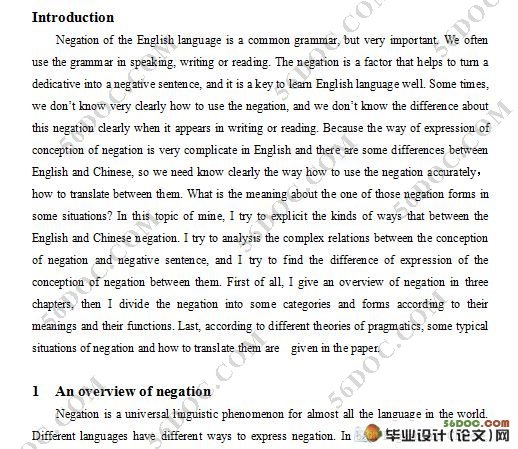英汉否定形式的语用对比研究

1.无需注册登录,支付后按照提示操作即可获取该资料.
2.资料以网页介绍的为准,下载后不会有水印.资料仅供学习参考之用.
密 惠 保
英汉否定形式的语用对比研究(含任务书,开题报告,中期检查报告,毕业论文7700字)
摘 要:本文先以对比语言学,词汇学和句法学为理论基础,展开对英汉两种语言否定的对比研究,探讨中英否定句的翻译之道。首先,文章对否定句做了一个大致的介绍。然后,文章介绍了否定的形式。在本文中,作者根据形式与意义的一致性英汉否定分为“显性否定”和“隐性否定”并进行研究。此外,作者还选用西方语言哲学家Grice的会话合作原则、Leech的礼貌原则及顾中国的汉语礼貌理论,解释语言行为。在对这些理论研究的基础上,出于语言差异,对于一些特殊场合下的否定,作者也给出了若干意见。
关键词:否定;语用;英汉对比
A Contrastive Analysis to Negation in English and Chinese from a Pragmatic Perspective
Abstract: This contrastive analysis of English and Chinese negation is conducted on the basis of linguistics, lexicology and syntactics, aiming to find out a good way to translate between English and Chinese.First of all, the papers starts with an overview of negation.Then, it comes the forms of negation.In this paper, English and Chinese negations fall into explicit form and implicit form on the incongruity of form and meaning.At last, the author chooses Grice's Cooperative Principle, Leech's Politeness Principle and GuYueguo's Chinese Politeness theory to explain speakers' verbal behaviors.By analyzing such theories, the author gives some advices about the difference of negation and some diversity of language in some typical situations.
Key words: Negation;Pragmatic perspective;Contrast in English and Chinese

Contents
Abstract…………………………………………………………………………1
Key words………………………………………………………………………1
Introduction………………………………………………………………………2
1 An overview of negation......................................……………………………2 [资料来源:THINK58.com]
1.1 The definition of negation......................................………………………………….2
1.2 Classification of negation..............................……………………………………… 3
1.3 Negation at different levels...............................………………………3
2 Forms of negation in English and Chinese.................................................……3
2.1 Explicit negation at the lexical level…..…..……………………………………3
2.2 Explicit negation at the syntactic level................……………………………4
2.3 Implicit negation at the lexical level………………………………………………7 [来源:http://www.think58.com]
2.4 Implicit negation at the syntactic level...................……………………………….....8
3 Pragmatic theories of negation........................... …………………………………9
3.1 Grice’s coorperative principle…………………………………………………9
3.2 Leech’s politeness principle...............................………………………………10
3.3 Chinese politeness theory…………………………………..............…………11
4 Contrast of negation in different situations………………….…………………12 [来源:http://think58.com]
4.1 Negation in receiving a compliment……………………………………………... .12
4.2 Negation in accepting thanks………………………………………………………13
4.3 Negation in receiving an offer………………………….………………… … ... …13
4.4 Negation in receiving a gift………………………….…………… ……………….14
4.5 Negation in giving a speech……………………………………… ……………….15 [资料来源:http://think58.com]
4.6 Negation in refusing a request………………………….…….…………………….15
4.7 Negation in asking a question……………………………..…………………….....16
4.8 Negation in giving a present……………………………………..……………… ..17
Conclusion………………………………………………………………….…18
Notes…………………………………………………………………………………...18 [来源:http://www.think58.com]
Bibliography……………………………………………………………………………18
Acknowledgements………………………………………………………………………19 [资料来源:http://www.THINK58.com]
